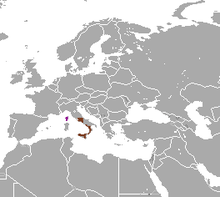Corsican hare
| Corsican hare[1] | |
|---|---|
| Scientific classification | |
| Kingdom: | Animalia |
| Phylum: | Chordata |
| Class: | Mammalia |
| Order: | Lagomorpha |
| Family: | Leporidae |
| Genus: | Lepus |
| Species: | L. corsicanus |
| Binomial name | |
| Lepus corsicanus de Winton, 1898 | |
 | |
| Corsican Hare range | |
The Corsican hare (Lepus corsicanus), also known as the Apennine hare or Italian hare, is a species of hare found in southern and central Italy and Corsica.[2]
Taxonomy
It was first described as a species in 1898 by British zoologist William Edward de Winton using specimens from Corsica.[3] It was later regarded as a subspecies of the European hare (L. europaeus) or both were treated as subspecies of the Cape hare (L. capensis). It is now often treated as a full species as it does not appear to hybridize with the European hare where their ranges overlap and studies of mitochondrial DNA suggest that it belongs to a distinct lineage which differentiated in isolated refuges during the last glacial period.[3]
Description
It is similar to the European hare in appearance, being largely brown with a cream-coloured belly. It differs in having grey rather than white bases to the hairs of the underfur. It is smaller on average than the European Hare with a head and body length of 44.1—61.2 cm, a tail length of 6.6—11.2 cm and a weight of 1.8—3.8 kg.[4] The ears and hind legs are relatively longer, 9—12.6 cm and 11.4—13.5 cm respectively.[4]
Distribution and habitat
It is found in maquis shrubland, grassland, cultivated areas and dunes. It is common and widespread on Sicily where it occurs from sea-level up to 2400 metres on Mount Etna. On mainland Italy, its range is more fragmented, extending patchily north to Tuscany on the west coast and Foggia on the east coast. It was introduced to Corsica by man, probably between the 14th and 17th centuries, and is currently rare there with only a few recent records.[2]
Status and conservation
Its population appears to be declining and it is classified as "Vulnerable" by the International Union for Conservation of Nature (IUCN).[2] It is threatened by habitat loss, hunting and competition with European rabbits and introduced populations of European hares. It is now protected from hunting but the similarity between this species and the European hare makes protection difficult to enforce.[2]
References
| Wikispecies has information related to: Lepus corsicanus |
- ↑ Wilson, D.E.; Reeder, D.M., eds. (2005). Mammal Species of the World: A Taxonomic and Geographic Reference (3rd ed.). Johns Hopkins University Press. ISBN 978-0-8018-8221-0. OCLC 62265494.
- 1 2 3 4 5 Angelici, F.M., E. Randi, F. Riga & V. Trocchi (2008) Lepus corsicanus. In: IUCN (2008) 2008 IUCN Red List of Threatened Species Archived June 27, 2014, at the Wayback Machine.. Downloaded on 18 January 2009.
- 1 2 Randi, Ettore (2007) Phylogeography of South European Mammals. In: Weiss, Steven & Nuno Ferrand (2007) Phylogeography of Southern European Refugia, Springer.
- 1 2 Aulagnier S.; P. Haffner, A. J. Mitchell-Jones, F. Moutou & J. Zima (2009) Mammals of Europe, North Africa and the Middle East, A&C Black, London.
